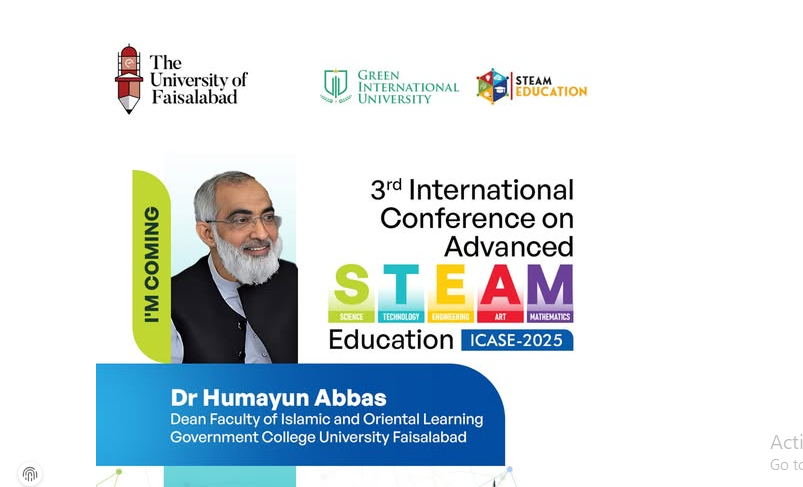Enhancing Islamic Studies in Pakistan: Addressing Challenges, Improving Standards & Guiding Research Directions
Islamic Studies holds a central place in Pakistan’s academic and societal landscape, shaping moral understanding, faith-based learning, and ethical decision-making. At the STEAM Conference 2025, the session “Enhancing Islamic Studies in Pakistan: Addressing Challenges, Improving Standards and Guiding Research Directions” brought together scholars from across Pakistan and abroad to reflect on modern challenges and explore new pathways for strengthening Islamic scholarship. The session took place in Room 006, Venue 5, under Islamic Studies 1.
The session was led by Chair: Dr. Humayun Abbas (GC University, Faisalabad), who emphasized the evolving responsibility of Islamic scholarship in a rapidly changing world. Co-Chair: Dr. Humeira Khalil (The University of Faisalabad) highlighted the need to integrate classical Islamic teachings with modern research methodologies to raise academic standards and address contemporary issues.
**Prophet Muhammad (ﷺ) and The Foundation of Human Rights: An Analytical Study
Muhammad Zaid Malik — King Saud University, Saudi Arabia (Invited Talk)**
The session opened with a profound keynote by Muhammad Zaid Malik, who presented a detailed analytical study proving that the principles of human rights were laid centuries before modern charters, rooted deeply in the Seerah of Prophet Muhammad (ﷺ). He highlighted concepts such as justice, equality, dignity, and protection of minorities, and demonstrated how these prophetic principles continue to serve as universal frameworks for modern human welfare and rights-based governance.
**Gender-Based Violence: A Comparative Evaluation of Pakistan and South Korea
Muhammad Rizwan Mahmood — Rifah International University, Faisalabad**
Muhammad Rizwan Mahmood provided a comparative analysis of gender-based violence reduction strategies in Pakistan and South Korea. His study assessed policy effectiveness, cultural barriers, and institutional gaps. He emphasized how Islamic ethical principles can guide equitable policies and support vulnerable populations. The research highlighted the need for stronger implementation mechanisms, community engagement, and faith-informed awareness campaigns.
**Ethics and Morality in Islam: Principles for a Better World
Abdul Qayyum Gondal — Lincoln University College, Malaysia**
Abdul Qayyum Gondal focused on the foundations of Islamic ethics and morality, exploring their relevance in shaping harmonious societies. He explained Qur’anic and Prophetic guidelines on justice, compassion, honesty, and social responsibility. The talk underscored how Islamic moral principles can contribute to global peace, ethical leadership, and sustainable development when combined with contemporary socio-cultural understanding.
**The Prophet Muhammad (ﷺ) as the Champion of Human Rights
Hafiz Muhammad Jamil Ur Rehman — The University of Faisalabad**
Hafiz Muhammad Jamil Ur Rehman presented a historical and contemporary analysis of the Prophet Muhammad’s (ﷺ) role as the true torchbearer of human rights. The research highlighted examples from the early Islamic state where the Prophet protected women’s rights, ensured economic justice, safeguarded non-Muslims, and promoted freedom from oppression. The study connected these prophetic practices to modern human rights narratives.
**Environmentalism in Islam: Philosophical Foundations
Hifsa Munawar — The University of Faisalabad**
Hifsa Munawar explored the rising global concern for environmental sustainability through an Islamic lens. Her research explained how the Qur’an emphasizes balance (mīzān), stewardship (khilāfah), and responsible use of natural resources. She argued that Islamic environmental principles can serve as strong philosophical foundations for addressing climate change, ecological imbalance, and ethical resource management.
**The Role of Social Media in the Growth of Islamic Society
Kalsoom Akhtar — The University of Faisalabad**
Kalsoom Akhtar examined how social media platforms are shaping contemporary Islamic discourse. Her presentation highlighted both opportunities—such as widespread access to authentic knowledge—and challenges, including misinformation and unverified religious content. She emphasized the need for digital literacy, ethical online behavior, and scholarly oversight to ensure social media contributes positively to Islamic societal growth.
**Interdisciplinary Research in STEAM: Global Trends and Future Directions
Esarullah Khan — Bahria University, Karachi**
Esarullah Khan introduced emerging global trends in interdisciplinary STEAM research, emphasizing how Islamic perspectives can enrich fields such as ethics in technology, bioethics, and social sciences. He encouraged the integration of Islamic thought with modern academic inquiry to produce innovative, ethically grounded research.
**Seerah and Human Rights: Insights from the Life and Legacy of Prophet Muhammad (ﷺ)
Mian Muhammad Ali Awais — Lyallpur Institute of Medical & Social Sciences**
Mian Muhammad Ali Awais explored how the Seerah offers timeless guidance on human dignity, protection of vulnerable groups, and inclusive governance. His study highlighted how revisiting prophetic practices can inform contemporary policymaking, legal reforms, and social justice initiatives.
**Closing Presentation: Strengthening Research Directions in Islamic Studies
Hafiz Muhammad Adnan Hamid — The University of Faisalabad**
In the concluding talk, Hafiz Muhammad Adnan Hamid emphasized the need for methodological rigor, integration of classical scholarship with modern research tools, and the development of specialized areas such as Islamic bioethics, digital media studies, and human rights jurisprudence. He highlighted the importance of guiding young researchers toward relevant and high-impact topics that address Pakistan’s present-day challenges.
Conclusion
The session on enhancing Islamic Studies offered profound insights into how Islamic scholarship can address social, ethical, environmental, and digital-age challenges. Under the leadership of Dr. Humayun Abbas and Dr. Humeira Khalil, the session fostered a unified vision: to elevate Islamic Studies through enhanced academic standards, revitalized classical wisdom, and innovative research methodologies.

